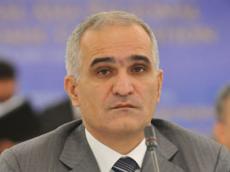Today.Az » Business » Azerbaijan forecasts high economic growth in coming years
05 March 2013 [10:46] - Today.Az
 By AzerNews
By AzerNews
Azerbaijan seeks to achieve high economic growth rates over the next five years.
In 2013-2017, the economic growth rate in Azerbaijan is forecasted at 5.1 percent on average, with 8 percent growth expected in the oil sector, Economic Development Minister Shahin Mustafayev said at a meeting with the International Monetary Fund (IMF) mission to Azerbaijan led by the departmental adviser on the Middle East and Central Asia (MCD), Raja Al Marzouqi.
According to Mustafayev, the average annual inflation rate for this period will stand at 4.4 percent.
The minister also informed the IMF mission about the economic reforms implemented in Azerbaijan, the economic situation in the country as of the end of 2012 and development trends recorded in recent years.
The sides mulled the macroeconomic framework in 2013, the activities to be carried out to boost the development of the domestic non-oil sector, especially the private sector.
Earlier the IMF said that Azerbaijan's economic growth will be at 3.8 percent in 2013. The figure is slightly over the projection made by the Asian Development Bank (ADB), which expects 3.5 percent GDP growth.
Azerbaijan's GDP growth in 2012 made up 2.2 percent and the growth last year as in the previous year was entirely provided by the non-oil sector. The growth of the non-oil economy in 2012 was 9.7 percent, and its share in GDP rose to 52.7 percent. GDP per capita made up 5,884 manats ($7,490) in 2012.
The IMF mission is on visit to Azerbaijan from February 26 until March 12 to hold consultations with the Azerbaijani government on Article IV of the IMF Establishment Agreement.
During the visit, the mission also held talks with the Central Bank of Azerbaijan (CBA) on the preparation for the new Financial Sector Assessment Program (FSAP) of the country.
The meeting with CBA Chairman Elman Rustamov discussed the economic situation based on the results of 2012, macroeconomic forecasts and monetary and exchange rate policy in 2013.
FSAP assessment will be conducted in early 2014. The first estimate of the IMF was conducted jointly with the World Bank as part of the program in 2003.
Following the first evaluation, Azerbaijan adopted the laws "On Banks" and "The National Bank", and a set of regulations aimed to remove all the questionable items indicated in the first FSAP.
As a part of the FSAP, the World Bank and IMF experts conducted stress-tests, which revealed a high ability of the banking system to resist risks reducing overall performance. They demonstrated that even with a decline of figures by 50-70 percent (the worst case scenario), the banking system will not plunge to zero capital and its assets exceed the liabilities, which is a good indicator.
Azerbaijan joined the IMF in September 1992. The cooperation between the organisation and the country was particularly intense in 1995-2005. During these years, Azerbaijan often used the advice and financial assistance of the IMF to support the government's economic programs.
The IMF office was opened in Baku in 1992. Despite its staff being reduced since 1999, it remains an important partner of the Azerbaijani government.
|
|